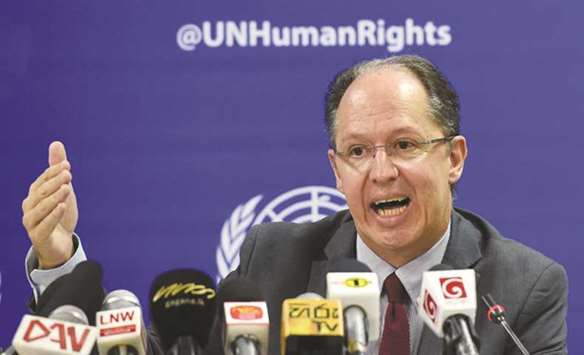A United Nations expert warned yesterday that Sri Lanka must speed up its own long-stalled investigation into war crimes by troops or risk action by the international
community.
Pablo de Greiff, the UN special rapporteur on the promotion of justice and reparation, said Sri Lanka had been slow to deliver on its promise of justice for atrocities during the island’s bloody 37-year civil war.
He said allegations of war crimes levelled last month against Sri Lanka’s then-ambassador to Brazil, who was a general during the war era, underscored the risks faced by senior military officers past and present.
“As the recent case presented in Brazil against a former member of the armed forces demonstrates, accountability will be sought either here or abroad,” de Greiff said in Colombo
yesterday.
The case in Brazil against retired general Jagath Jayasuriya was just the “tip of the iceberg”, de Greiff said.
He said Sri Lanka could expect similar efforts by foreign jurisdictions until it had taken steps to ensure a credible
investigation of its own.
Jayasuriya left Brazil two days after the International Truth and Justice Project, a South Africa-based rights group, filed a case against the former general.
De Greiff criticised a public assurance given by Sri Lankan President Maithripala Sirisena to troops that he would not allow “war heroes” to be prosecuted for alleged atrocities.
Sri Lankan forces defeated Tamil Tiger rebels in May 2009 after a brutal guerrilla war which claimed the lives of at least 100,000 people.
The military was accused of massacring up to 40,000 ethnic Tamil civilians in their
no-holds-barred offensive.
Sri Lanka’s former regime refused to acknowledge the civilian toll of its wartime campaign, drawing censure from the
international community.
Sirisena’s government came to power in January 2015 promising justice for war victims, but his administration has been accused of dithering ever since.
Sirisena, unlike his predecessor Mahinda Rajapakse, agreed to investigate war crimes but has yet to take the necessary steps to do so.
De Greiff said the government’s pledge to pay reparations and prevent future atrocities was no substitute for accountability
for past injustices.
He urged it to adopt a timeline for achieving this and encouraged closer interaction with the UN human rights chief’s office.

UN Special Rapporteur on Transitional Justice Pablo de Greiff takes part in a press conference in Colombo yesterday.
